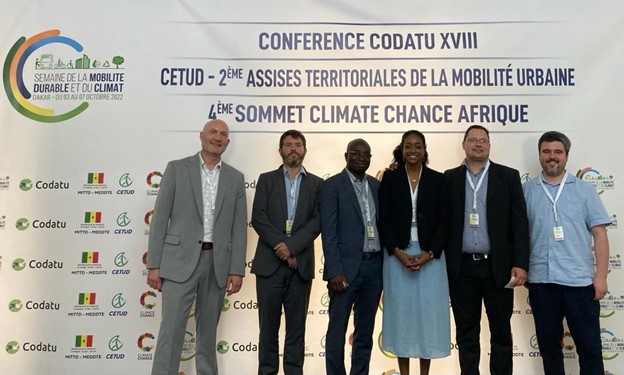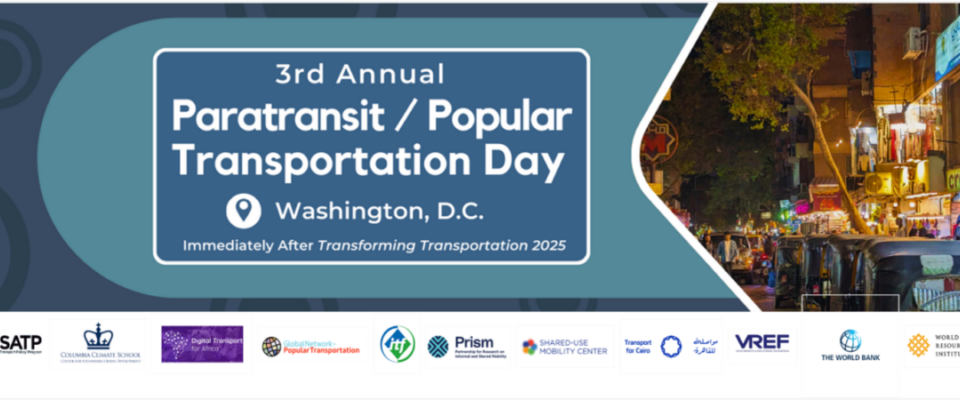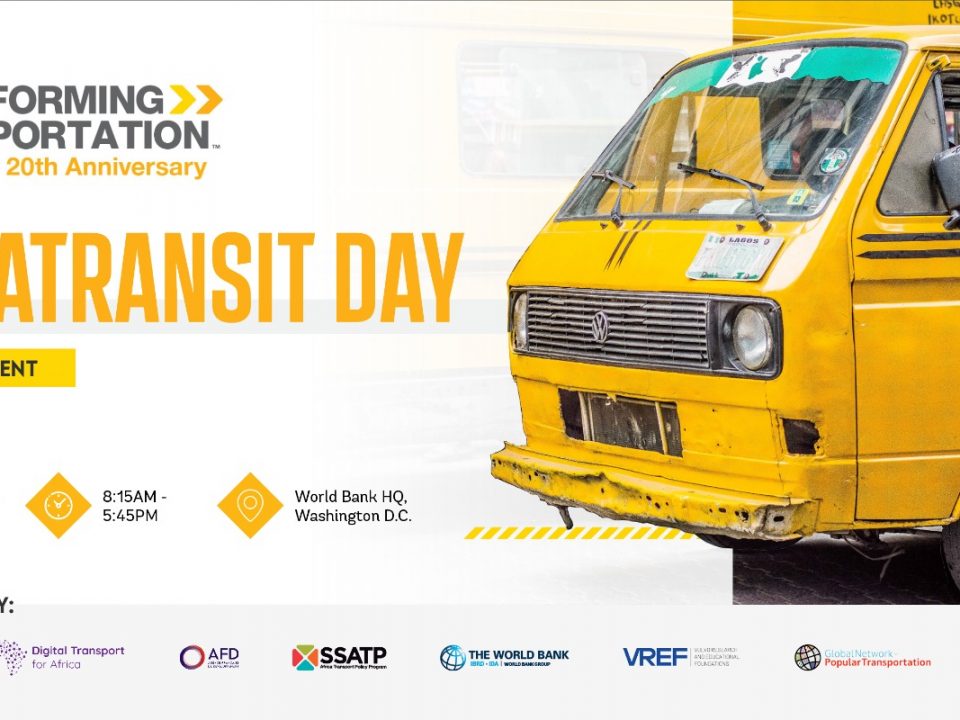Highlighting the work of Digital Transport for Africa (DT4A) at the Sustainable Mobility and Climate Week 2022

Public Transport Challenges in Africa: Mapping and Transit Data as a Remedy
6 October 2022
DigitalTransport4Africa (DT4A) Webinar Series: Data Collection Efforts in Informal Transportation & Shared Mobility Around the World
23 November 2022Dakar, Senegal
The Week for Sustainable Mobility and Climate, organized by the CODATU Association, CETUD and the Climate Chance Association took place on 3rd to 7th October 2022 in Dakar, Senegal. WRI Africa, in partnership with the Agence Française de Développement (AFD) and with the support of DT4A partners, organized three sessions to highlight the work of Digital Transport for Africa (DT4A).
Open and Standardized Transport Data Towards Sustainable Mobility
Sharing and leveraging open, standardized public transport data for all modes including walking, cycling and popular or “informal” transport is a critical tool for improved planning, operations, investment decisions. The goal is to build communities of practice around open data and promote established transport data such as the General Transit Feed Specification (GTFS). African city governments, private enterprises and civil societies have increasingly shown interest in utilizing new technologies and data for integrated transport systems. However, such ongoing attempts are still in their early stages. On the one hand, many private mapping companies rely on universities, international organizations and development banks for their main funding source while they experiment and look for sustainable business models. On the other hand, most African cities still lack financial and technical capacity to establish digital infrastructure to curate, maintain and update open transit data.
The session examined the possibilities offered by the opening and standardization of transport data in African cities. This was done through several use cases —DigitalTransport4Africa initiative, along with inspiring projects such as Transport for Cairo (TfC) and Data.Transport, followed by a panel discussion with transport authorities, private sector players and non-profit entities including l’Autorité de la Mobilité urbaine dans le Grand Abidjan (AMUGA) and Conseil Exécutif des Transports Urbains de Dakar (CETUD) to explore the promises and challenges of digitizing transport in Africa. It was a great opportunity for the two major public institutions – AMUGA and CETUD to explain their role and approach towards sustainable mobility and innovation to a wider audience and to exchange best practices that other African cities might adopt – AMUGA stated its ambition vis-à-vis the introduction of a traveler application “my journey” aimed to enable public transport users to choose their mode of transport, furthermore to ensure that the transport companies can be competitive in addressing the challenges of the future including the technological mastery of the transport sector. Whereas the CETUD explained its strategy regarding transport data, whereby it is pursuing the harmonization of all transit data towards its implementation of traveler information.
At the end of the session, the interaction and discussion agreed to maintain and advocate for the DT4A pledge agreement for the provision of standardized and open urban mobility data for African cities.
Electrification, Data and Informal Transit in Africa
The roll-out of electric vehicles (EVs) in African cities is underway, although the focus is more often on the electrification of private vehicles, motorcycles, and mass transit like Bus Rapid Transit. There is much less activity around paratransit minibuses, though they are integral to public transport across Africa. Paratransit services are essential for how urban African residents access opportunities such as jobs, education centers and other amenities. In addition, the livelihoods of all who work as operators, drivers, conductors, and maintenance personnel in the sector depends on this system. As such, electrification of minibuses cannot be viewed solely as a technological fix but instead must be seen as a complex process that can reshape the paratransit ecosystem as well as the urban fabric of African cities. For the transition to be equitable, just, and clean, fundamental missing pieces such as data problems must be addressed. In parallel, paratransit electrification must be acknowledged as just one piece of a larger whole, of sustainable mobility agendas.
The session examined the emerging landscapes of transport electrification in African cities, with a focus on the electrification of informal/paratransit transport and the role of data in informing this process. Invited expert researchers in this field presented their on-the-ground understanding of the challenges and opportunities in this sector, overview of electrification projects across Africa and an overview of public transport electrification projects in the Western Cape, South Africa and what kind of data would be generated/needed for these projects (e.g., grid capacity, charging time, operating characteristics, stakeholders, etc.). A panel discussion with outstanding guest speakers from academic institutions like LVMT, Paris and Stellenbosch University and non-profit entities like WRI, CODATU and TUMI explored key policies for transition in the African context. Ultimately, the aim of the session was to stimulate dialogue on potential research and practice collaborations within the broad DT4A consortium to complement its efforts in open data and public transport mapping.
At the end of the session, reflections and discussions highlighted the importance of making data on informal transport available and informing policy makers of the data needed to facilitate proper planning for electrification. Furthermore, it was emphasized that the basic data on informal transport systems should be established considering all the ecosystems around including the boda boda industry, which is a popular mode of transport in most African cities, including women and their mobility needs, focusing on the dimension of transit data, in-depth analysis, technical studies, energy transition, etc. to properly define what is really needed for the African continent before embarking on the electrification project in order to avoid any possible risks that could set the African continent back towards electrification and sustainable mobility as a whole.
Transforming Africa’s Transit through the DT4A Innovation Challenge
Digitizing transit routes and making them available in standardized format such as General Transit Feed Specification (GTFS) has enormous potential to fill existing gaps in improving overall African mobility by making transit and infrastructure data more accessible to the community. Consistent data collection and curation efforts require significant resources. There is a strategic role to support new and creative solutions that are burgeoning across Africa’s digital mobility landscape. One approach is by offering a competition-based technical and financial support program for startups, academic institutions and private organizations with initiatives that contribute to the movement towards open transit data and innovation across the African region.
DigitalTransport4Africa (DT4A) has launched the DT4A Innovation Challenge in December 2021, a premier pilot that strives to be an initial response to urban mobility challenges by awarding and spotlighting mapping initiatives and telling their stories of how they are making an impact on the African continent.
The session examined the emerging evidence from our first ever distinguished guest speakers, the winners of the DT4A Innovation Challenge, namely namely Addismap, Ewarren, KhartouMap and GoMetro. who shared the challenges and opportunities on the ground with the aim of making a valuable contribution to identifying practical solutions for transit in Africa. The session also highlighted the importance of providing awards and grants to civil society actors and start-ups to launch their projects and demonstrate their impact while companies test and refine their long-term strategies and business models.
At the end of the session, the discussion focused more on what support local governments would need to conduct or encourage (and continue to maintain) the kind of mapping and innovation that they were pursuing. Overall, the Winners of the DT4A Innovation Challenge stressed that:
- The governments need continued support with mapping technology and to understand the value of getting more data;
- The participation of the bus drivers and operators unions would be essential;
- The importance of upgrading the requirements of local governments to collect geographic and dynamic data on a regular basis and;
- Governments need to understand the value of open data and open software.
Materials from the three sessions are available here.




